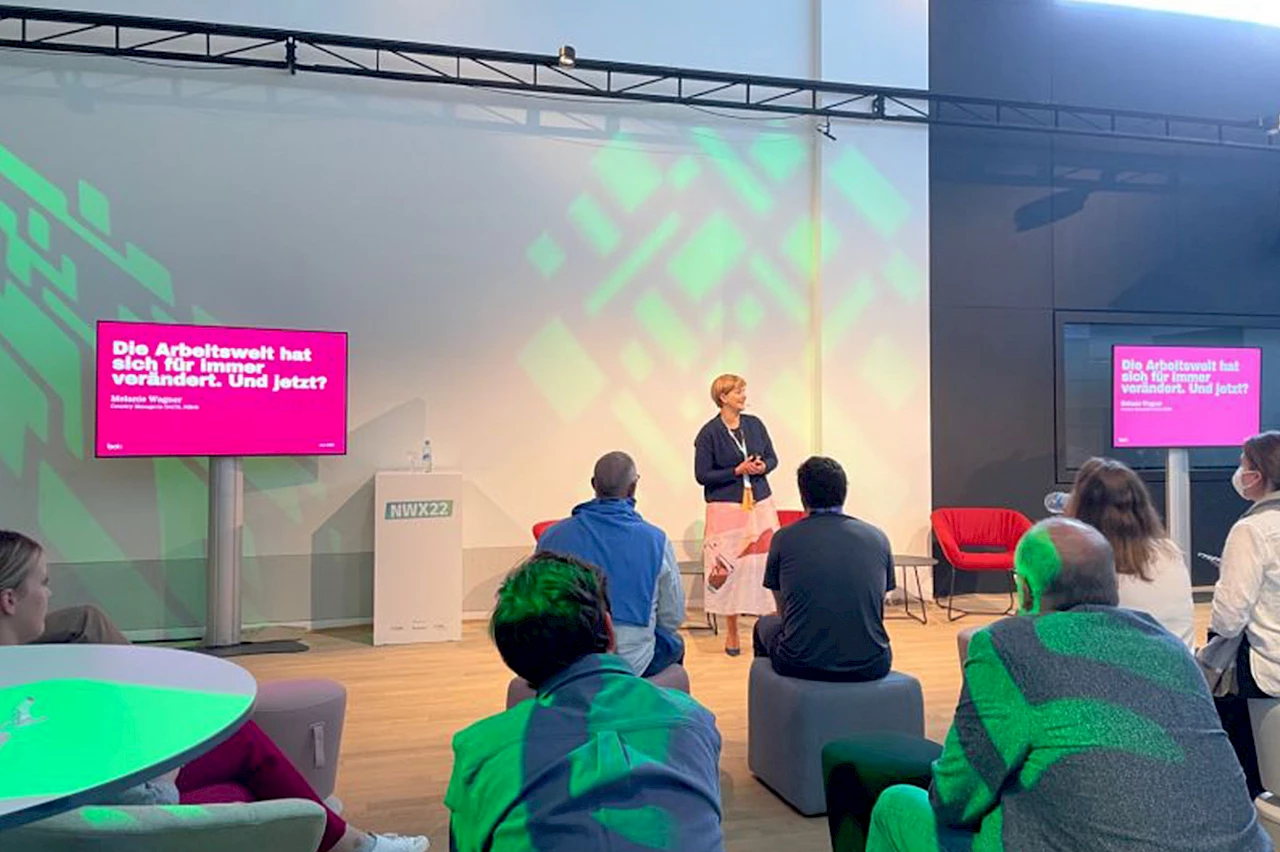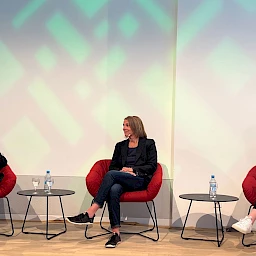Melanie Wagner, Country Manager DACH of the Israeli HR tech company HiBob, adressed the changing working world and the question of what expectations of work the younger generations of employees in particular have in her keynote. With these expectations, not only the demands on modern workplaces changed. They also put topics such as mental health and a flexible organisation of the workdays and workspaces on the agenda of HR managers.
What moves the new generation of employees
“We are no longer staff numbers, we are people.” This is how Melanie Wagner, who studied politics and law in Heidelberg and held leading positions in international IT/tech companies, introduced her NWX keynote. Her central statements in keywords: It was not only the Corona pandemic that changed the working world. It is increasingly defined by younger employees who value their work completely differently than older generations. Generations Y (Millennials) and Z, i.e. those born between 1981 and 2012, are primarily engaged in the meaning of work, the vision of a company and the moral motivation of the individual. The values of these employee generations are just as individual as their demands on leadership.
Young generations question classic hierarchies and want to be perceived as people and to be treated with appreciation by management. They also want to be able to organise their working hours according to hybrid models. This confronts companies with unprecedented challenges. Rigid work structures and the classic “nine to five” job are passé. The younger generations are looking for more flexibility in their jobs and a habitat and workspace that fits their values. So, although living expenses and financial security are very important to the younge generations of employees, the basic recruitment issues have changed. Issues such as the number of business trips or the availability of a company car have taken a back seat to the possibility of working from home and taking care of family.
Covid-19 has accelerated the transformation of the working world and hit like a meteor. The new reality consists of the realisation of personal goals in life on employee side and necessary change processes on company level.
Melanie Wagner
Modern HR requires flexibility
Rigid working hours, office only and working in urban centres belong to the past in this new working world. Work from Home (WFO), Work from Office (WFO) and Work from Anywhere (WFA) are, as a consequence, the components of a modern “hybrid work” mix. Employees want more flexibility especially in terms of when, where and how they work. The representatives of Generation Z and Y want to be able to balance career and personal life, but also separate them from each other; the habitats should not mix too much. Their preferred New Normal is a workweek with two to three office days and working from home on Monday and Friday. In the USA, 83 per cent of all employee generations even prefer a 4‑day week, Wagner quoted a survey by GoodHire.
New Issues on the Agenda of Human Resources Managers
Aside from remote and hybrid work, issues such as employee health and mental health become the centre of focus. With 45 per cent of younger generations claiming to suffer from burnout, and as many as 50 per cent claiming to be permanently or mostly stressed, companies will have to prepare to put more emphasis on mental health discourse. The issues of diversity and inclusion (DE&I) are also becoming more important. For that purpose, there is an increasing shift from classic hierarchies towards dynamic teams and meaningful collaboration. Looking at the evaluated top five reasons of the “Microsoft Work Trend Index 2022” for employee dismissal, the main issues for the younger generations, besides personal well-being, are work-life balance (24 per cent), lack of trust in management or executives (21 per cent) and lack of flexible working hours and workspaces (21 per cent).
The classic recruitment processes have served their time
Melanie Wagner assumes that companies must make even more effort to bring talent on board and keep it. This can succeed by a corporate culture that is both employee-centred and regardless of office presence, and which pursues a clear vision. Credible corporate values must be made liveable and tangible. “Certainly, there will continue to be applications towards a company in the future,” says Wagner. However, the HR tech and sales expert sees companies increasingly having to engage in a kind of sales process in the talent market. She predicts success in recruiting for companies that present themselves to potential employees in the best possible way and authentically highlight the purpose of work as well as the company’s purpose.
Looking at her own company, Wagner concludes by pointing out the advantages of new HR tools. To create a resiliently and inclusive corporate culture that can successfully deal with the rise of hybrid teams and flexible working, “intuitive HR tech platforms are needed that all members of an organisation, including HR teams, managers, supervisors and individuals, benefit from.”






